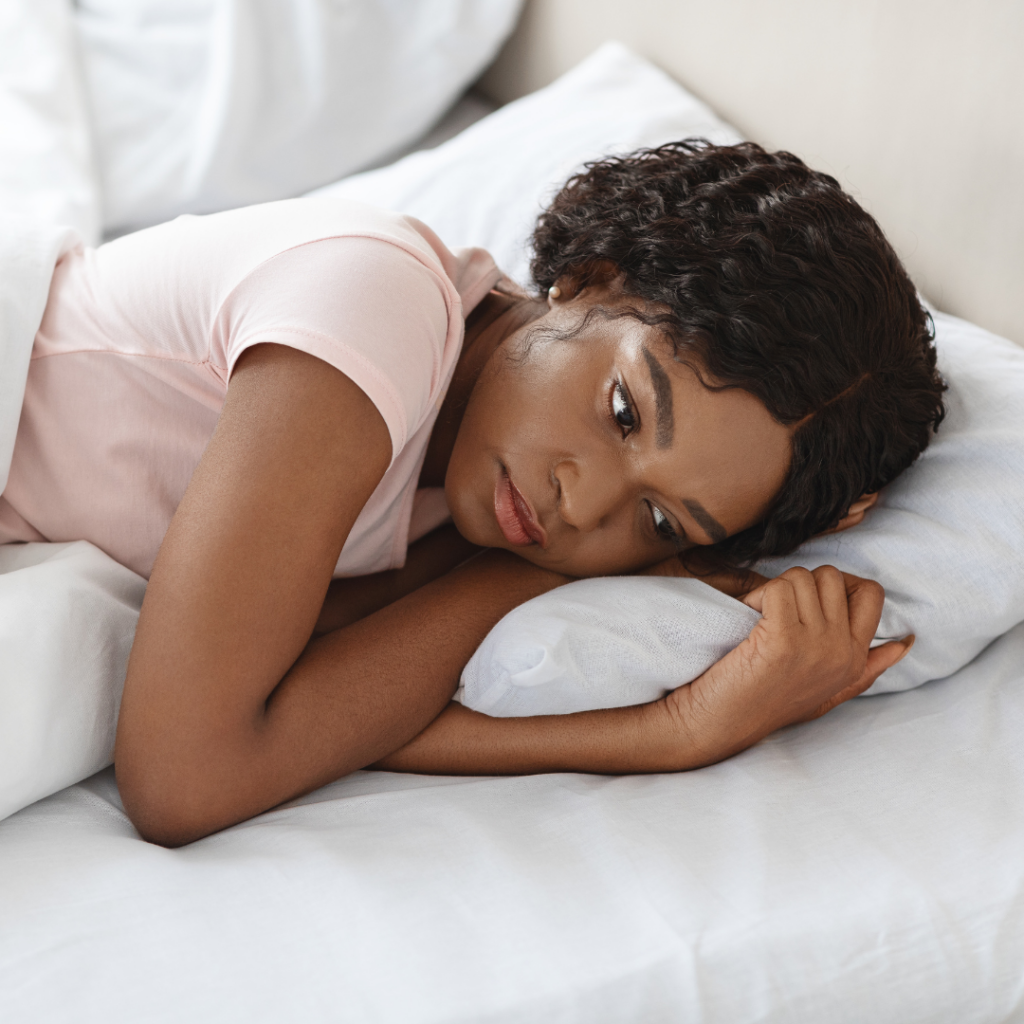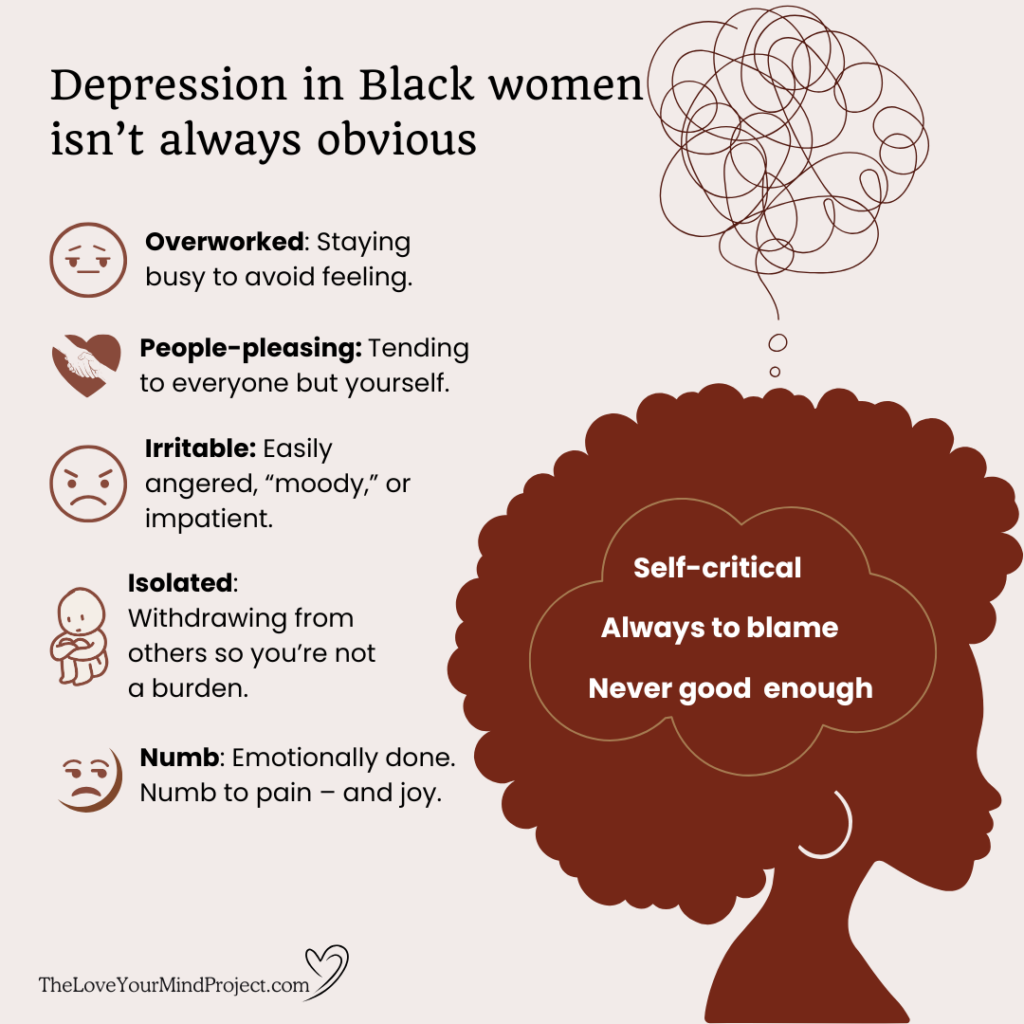- How to stop being a people pleaser—without feeling guilty - July 30, 2025
- How to heal from childhood trauma that still disrupts your life - July 23, 2025
- How to overcome fear of failure—and unlock unconditional self-love - July 17, 2025
When it comes to Black women and depression, our symptoms aren’t always obvious. Let’s know what to look for so we can get the help we deserve.

Depression isn’t always crying with a pint of ice cream, watching When Harry Met Sally.
It can look different in Black women. Maybe you always feel tired, overly emotional, irritable, or angry. Not knowing what it is or how to find relief, you could easily carry this burden for years, like so many of us have.
This article explores how depression often shows up in Black women’s lives and how we can take steps toward healing — because we deserve it.
What's in this article?
What is Depression?
Doctors typically describe depression as lingering feelings of sadness, hopelessness, and emptiness. It’s incredibly common, affecting nearly 21 million Americans each year 1. But that number only includes those who are diagnosed.
Women are more likely than men to experience depression 2. Black women are less likely than white women to get help 3.
Why? We face unique barriers to mental health care. One is believing we’re superhuman and our pain isn’t worth addressing 4.
But, the pain and heaviness you feel is real. And with help, you can feel better.
Depression is more than sadness
That heavy fog you may feel goes deeper than sadness. One of the most telling signs of depression is how you see and treat yourself.
Ask yourself a few questions:
- When you make a mistake, are you hard on yourself?
- Do you blame yourself for every bad thing, even if it’s outside your control?
- Does everything you do feel “not good enough?”
If you answered “yes” to any of these questions, you may be dealing with low self-worth — feeling inadequate or undeserving of good.
Low self-worth is a major contributor to depression 5, often showing up as self-blame, harsh inner criticism, and constant negative self-talk. This isn’t a sadness you can simply snap out of, but a thought and behavioral pattern you can recognize and shift out of with the help of a professional.
But it doesn’t mean you’re weak
Depression doesn’t make you weak. It doesn’t mean you’re being punished or reaping what you sowed.
You’re carrying a lot.
A lot of factors can cause depression: stress, trauma, chemical imbalances in the brain, and even genetics 6. But, for all these reasons, you are not one of them.
You don’t have depression symptoms because you’re ungrateful or lack faith. No, you may just need help learning how to process pain and release your burden. And that’s possible.
How depression can show up in Black women
Depression affects each of us differently. But Black women are more likely to mask our struggles and try to “keep it moving.”
Here’s what you might experience, according to Dr. Bernadette Anderson, MD, MPH.
- Overworked: You may pour yourself into your job, church, or community to avoid feeling pain.
- People pleasing: Depression can manifest as showing up for everyone except yourself.
- Irritable: If you feel easily triggered or “moody,” it could be a sign of depression.
- Isolated: You may prefer to be alone, especially if you always feel like a burden around others.
- Numb: Many of us are emotionally checked out, a defense mechanism protecting us from pain, but also making it harder to experience joy.
You may not notice the pain when it’s been your norm for so long. But no matter how long you’ve dealt with depression, you’re still worthy of healing.

Signs the burden is too heavy
The weight of depression can overwhelm us if left unaddressed, regardless of education, income, marital status, or faith. Here are signs that it’s time to get help.
#1 Chronic fatigue
Are you sick and tired of being sick and tired? Fatigue is more than feeling sleepy. It’s a mental and emotional exhaustion that can drain you no matter how much you rest.
Fatigue from depression can make it difficult to handle your day-to-day responsibilities or show up for yourself or others. But you don’t have to “push through” this heaviness alone.
#2 Disrupted sleep
You may have trouble falling or staying asleep, or you can sleep all day and still feel unrested.
Quality sleep is essential to our mental and physical health because it’s when our brains rest and recover. If rest feels impossible because of depression symptoms, it’s okay to seek help.
#3 Withdrawn
It’s easy to draw back when we’re hurting. We don’t want to bother others, and we don’t always want people in our business.
But we all need genuine connection and community, especially with those who uplift us and remind us of what’s true – that we are worthy of love.
Isolation can deepen depression and feed self-critical thoughts 8. Don’t let that inner critic be the loudest voice you hear.
#4 Unmotivated
When depression is heavy, getting out of bed can feel impossible. Things you used to enjoy don’t do it for you anymore. You may feel completely detached from life, not caring for much of anything, including yourself.
If you feel numb, disconnected, or like you don’t matter, please consider reaching out to your doctor or the Suicide and Crisis Lifeline at 988.
You do matter, and life can get better.
#5 Harmful thoughts
If you’ve had thoughts of suicide, self-harm, or simply wish you weren’t here, please take them seriously.
You’re not “crazy,” you’re hurting. And healing is possible.
Even if you’d never act on those thoughts, wishing to disappear or feeling like the world would be better without you, are signs that it’s time for support.
You are loved, wanted, and needed here. Even if you’ve never felt this unconditional love before, you can start now — with yourself.
Please text or call 988 for free, confidential support.
Getting help for depression
If you’re ready to get help, start with your doctor or a mental health professional. They may have you answer a questionnaire, where you rate the severity of your symptoms, to help determine the next steps.
Your treatment plan might include therapy, medication, or both, based on your needs and preferences.
Depression medication
Doctors may prescribe antidepressants to treat severe symptoms. They regulate the brain chemicals that affect mood, sleep, and energy. The most common type, selective serotonin reuptake inhibitors (SSRIs), increase serotonin levels 9.
These medications take time to work and may require dosage adjustments. But with time, the right one can make your depression symptoms more manageable as you address the root cause.
As with any medication, always talk to your doctor about possible side effects and what to expect.
Therapy for depression
Talk therapy can be crucial to treating depression. It helps uncover what’s really behind the pain.
In therapy, you’ll work with a professional who can help you process past trauma, overwhelming emotions, and harsh experiences in a safe, non-judgmental space.
With time, you’ll learn how to identify and shift away from harmful thoughts and behaviors that can fuel low self-worth and other symptoms of depression.
Taking the first step toward healing
Deciding you want help with depression is already a powerful step. From there, reach out to a provider you can trust on this journey. Start with your doctor or find a therapist through an online platform or directory.
Remember, you don’t have to accept this heaviness as is. You deserve to feel better. And with the right support, you can.
Black women and depression FAQs
How do I know if I’m depressed?
If you feel sad, irritable, numb, or hopeless, more often than not, you could be dealing with depression. It’s a common condition worth seeking help for, especially if it’s getting in the way of living a full life. Talk with your doctor or a licensed mental health professional to explore your options.
What causes depression?
Depression can be caused by a lot of different factors, including chronic stress, trauma, verbal and physical abuse, grief, and genetics. If you deal with depression symptoms, it’s not because of anything you’re doing wrong. Symptoms are more likely a sign of deeply unmet emotional needs.
Can Christians be depressed?
Christians can be depressed. It is not a lack of faith or prayer. Neither is it an insult to God (who already knows what you’re dealing with). The Bible gives multiple examples of God’s chosen ones experiencing depression, including Jesus in Gethsemane before standing trial (Matt. 26:37-38). In addition to prayer and faith, therapy helps you process and grow from pain. Medication can help manage overwhelming symptoms.
How do you get out of depression?
There’s no quick fix to get out of depression, but healing is possible with time and the right support. Medication and therapy can be a long-term solution, helping you manage severe symptoms and identify the root causes. You can also practice simple, daily habits that support your mind’s overall health. Small steps can help you along this journey. Just remember, you’re not alone.
References
1 Depression | Mental Health America. (2025, January 7). Mental Health America. https://mhanational.org/conditions/depression/
2 Women’s increased risk of depression. (2025). Mayo Clinic. https://www.mayoclinic.org/diseases-conditions/depression/in-depth/depression/art-20047725
3 Pederson, A. B. (2023). Management of Depression in Black People: Effects of Cultural Issues. Psychiatric Annals, 53(3), 122–125. https://doi.org/10.3928/00485713-20230215-01
4 Woods-Giscombe, C., Robinson, M. N., Carthon, D., Devane-Johnson, S., & Corbie-Smith, G. (2016). Superwoman Schema, Stigma, Spirituality, and Culturally Sensitive Providers: Factors Influencing African American Women’s Use of Mental Health Services. Journal of Best Practices in Health Professions Diversity : Research, Education and Policy, 9(1), 1124. https://pmc.ncbi.nlm.nih.gov/articles/PMC7544187/
5 Zahn, R., Lythe, K. E., Gethin, J. A., Green, S., Deakin, J. F. W., Young, A. H., & Moll, J. (2015). The role of self-blame and worthlessness in the psychopathology of major depressive disorder. Journal of Affective Disorders, 186, 337–341. https://doi.org/10.1016/j.jad.2015.08.001
6 Depression: Causes, Symptoms, Types & Treatment. (2016, November 16). Cleveland Clinic. https://my.clevelandclinic.org/health/diseases/9290-depression#causes
7 Anderson, B. (2023, November 17). Depression in Black Women: 8 Signs to Look For. GoodRx. https://www.goodrx.com/health-topic/black-health/depression-in-black-women
8 What doctors wish patients knew about social isolation. (2023, September 15). American Medical Association; https://www.ama-assn.org/delivering-care/public-health/what-doctors-wish-patients-knew-about-social-isolation
9 Commonly prescribed antidepressants and how they work | NIH MedlinePlus Magazine. (2020). NIH MedlinePlus Magazine. https://magazine.medlineplus.gov/article/commonly-prescribed-antidepressants-and-how-they-work
